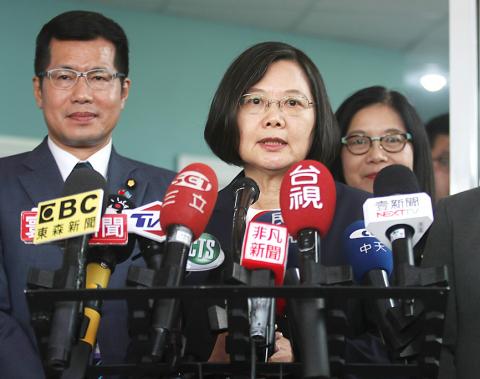Taiwan would handle the issue of Hong Kong residents arriving in the nation to seek political asylum “appropriately based on humanitarian considerations,” President Tsai Ing-wen (蔡英文) said.
Tsai, who is on a state visit to Taiwan’s Caribbean allies, made the remark when asked about a report by Radio Free Asia on Thursday that about 10 Hong Kong protesters have arrived in Taiwan to seek political asylum since the storming of the Hong Kong Legislative Council building on July 1 following a series of demonstrations against a bill that would allow people to be extradited to China.
The individuals have been given shelter by non-governmental organizations, the report said.

Photo: CNA
A Taiwanese lawyer who helps Hong Kong residents come to Taiwan told the broadcaster that they have encountered technical difficulties when seeking to extend their stay in the nation.
Meanwhile, Hong Kong’s Apple Daily, citing unidentified sources, yesterday reported that about 30 protesters have already arrived in Taiwan to seek asylum, while as many as 30 others — and possibly more — are planning to try soon.
The Mainland Affairs Council would not confirm whether there are people from Hong Kong seeking political asylum, saying only that it has seen an increase in the number of Hong Kongers inquiring about residency in Taiwan.
The council on Thursday said that if Taiwan receives applications from Hong Kong residents for political asylum, government agencies would handle each case in accordance with the law based on the principle of protecting human rights.
The government deals with visits or residency of Hong Kong citizens in accordance with the Act Governing Relations with Hong Kong and Macau (香港澳門關係條例), the council said, adding that it would provide assistance to Hong Kong citizens whose safety and freedom are threatened due to political factors.
The National Immigration Agency yesterday said it has not received any applications for political asylum from Hong Kongers.
The Taiwan Association for Human Rights would not comment on the issue.
“We cannot divulge any information regarding any individual case,” association secretary-general Chiu Ee-ling (邱伊翎) said. “If there are individuals who approach us for help, we’ll interview these people and help them get in touch with government officials if that is what they wish.”

CHAOS: Iranians took to the streets playing celebratory music after reports of Khamenei’s death on Saturday, while mourners also gathered in Tehran yesterday Iranian Supreme Leader Ayatollah Ali Khamenei was killed in a major attack on Iran launched by Israel and the US, throwing the future of the Islamic republic into doubt and raising the risk of regional instability. Iranian state television and the state-run IRNA news agency announced the 86-year-old’s death early yesterday. US President Donald Trump said it gave Iranians their “greatest chance” to “take back” their country. The announcements came after a joint US and Israeli aerial bombardment that targeted Iranian military and governmental sites. Trump said the “heavy and pinpoint bombing” would continue through the week or as long

TRUST: The KMT said it respected the US’ timing and considerations, and hoped it would continue to honor its commitments to helping Taiwan bolster its defenses and deterrence US President Donald Trump is delaying a multibillion-dollar arms sale to Taiwan to ensure his visit to Beijing is successful, a New York Times report said. The weapons sales package has stalled in the US Department of State, the report said, citing US officials it did not identify. The White House has told agencies not to push forward ahead of Trump’s meeting with Chinese President Xi Jinping (習近平), it said. The two last month held a phone call to discuss trade and geopolitical flashpoints ahead of the summit. Xi raised the Taiwan issue and urged the US to handle arms sales to

State-run CPC Corp, Taiwan (CPC, 台灣中油) yesterday said that it had confirmed on Saturday night with its liquefied natural gas (LNG) and crude oil suppliers that shipments are proceeding as scheduled and that domestic supplies remain unaffected. The CPC yesterday announced the gasoline and diesel prices will rise by NT$0.2 and NT$0.4 per liter, respectively, starting Monday, citing Middle East tensions and blizzards in the eastern United States. CPC also iterated it has been reducing the proportion of crude oil imports from the Middle East and diversifying its supply sources in the past few years in response to geopolitical risks, expanding

An Emirates flight from Dubai arrived at Taiwan Taoyuan International Airport yesterday afternoon, the first service of the airline since the US and Israel launched strikes against Iran on Saturday. Flight EK366 took off from the United Arab Emirates (UAE) at 3:51am yesterday and landed at 4:02pm before taxiing to the airport’s D6 gate at Terminal 2 at 4:08pm, data from the airport and FlightAware, a global flight tracking site, showed. Of the 501 passengers on the flight, 275 were Taiwanese, including 96 group tour travelers, the data showed. Tourism Administration Deputy Director-General Huang He-ting (黃荷婷) greeted Taiwanese passengers at the airport and